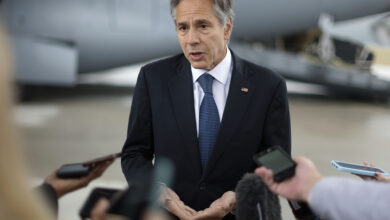Jaffa – Diplomatic isolation isn't dominating the news agenda in Israel these days. Neither is the lack of any peace process with the Palestinians. Today everybody seems to be talking about the so-called “cottage cheese scandal," the top item in the local news for more than two weeks.
The price of cottage cheese has jumped by nearly 40 percent over the past three years in Israel. For many Israelis this price hike was too much – and similar to popular mobilization in the rest of the Middle East – they organized on Facebook: More than 100,000 people today support an online-petition to boycott supermarkets and dairies claiming “outrageous prices.”
Along with other heads of state in the region, Prime Minister Benjamin Netanyahu is starting to feel the heat, albeit in a slightly less threatening way, from the grassroots protests. In a recent meeting of his cabinet ministers, he demanded “quick and immediate solutions.”
"We need creative answers here," Netanyahu said. Accordingly, the Israeli government considered both importing cottage cheese from Europe and implementing measures to weaken the dominant local diaries.
According to initiator of the protest, Yitzhak Alrov, an unassuming synagogue worker from the city of Bnei Brak (east of Tel Aviv), the struggle is about much more than cheese. Higher gasoline prices, it turns out, are part of the new struggle, along with a long list of other consumer products.
"Cottage cheese is not the essence," Alrov told journalists. "It has only become the symbol of a much wider protest."
The big dairies, however, do not intent to give in.
"I condemn this cottage cheese boycott, and will not let the food producers be subdued," countered Gadi Lessin, the head of the Strauss Corporation, one of the country’s largest food producers. Still, the sale of cottage cheese, now dubbed White Gold in the local press, is down by more than 45 percent.
But even the demonstrators, who in the last few days have frequently prevented consumers from buying cottage cheese in supermarkets, haven’t failed to see the irony: While huge parts of the Middle East are engaged in bloody demonstrations for democracy, they are worried about, well, cheese.
Many Israelis do feel the protest movement is only yet another sign of the locally famous so-called "escapism" – the idea that people have given up trying to solve the larger problems of society, and instead busy themselves with the small issues of their daily lives. According to this view, cottage cheese, as well as the local version of the TV-show “A star is born,” are only two expressions of that same phenomena.
And, indeed, you find plenty of manifestations of escapism in today’s Israel. In the more affluent parts of northern Tel Aviv, you will see nicely designed new cigar shops, while both elegant beauty salons and luxurious restaurants seem to do strikingly well in the center of the city these days.
But it's not the Israelis with cigars that would protest price hikes of cottage cheese. The class gaps in Israel are growing, and compared with North American or Western European countries, only the US has a larger gap between rich and poor. For hundreds of thousands of Israelis it actually does matter if the price of their cheese or milk jumps by a few shekels.
The Israeli economy, actually, has seen an impressive period of growth for more than two decades – mainly a result of the development of a strong local high-tech industry. International corporations, like Intel, Microsoft, Google and Motorola, have established Research and Development branches in Israel, linking the local high-tech industry to areas like California’s Silicon Valley. Israel’s 2010 GDP per capita, according to the World Bank, stands at around US$27,000.
Nevertheless, many Israeli families have fallen off the bandwagon, and poverty today is not only growing, but also hereditary; from generation to generation, many Israelis are living at the edges of the big cities in relatively sub-standard conditions. While Israel has an average standard of living similar to that of southern European countries like Italy and Spain, some 20 percent of the population lives below the national poverty line.
According to Latet, an Israeli humanitarian organization, more than 55 percent of the children living below the poverty line in 2010 were forced to give up a meal a day – due their families’ economic restraints, up 38 percent from the previous year.
"Poverty has deepened, and gaps between rich and poor have undoubtedly widened," Eran Weintraub, the director of Latet, recently told the Israeli daily Jerusalem Post. "The poor in Israel have no power and no voice."
Long gone, then, are the days when the unique kibbutz experiment dominated the Israeli economical outlook. Based on socialist idealism, and even challenging basic age-old concepts like private property, the early Israelis sought equality for all among them, seeking to eradicate income gaps in modern society. Today, however, Israel’s economic policies are more in sync with traditional free market capitalism, leaving the poorer segments of society without the safety nets of the past.
The growing new gaps, many in Israel worry, might have further implications beyond the mere economic spheres. For decades Israel was characterized by an unusual high sense of social solidarity, the glue that kept the Israelis together while facing an armed conflict with the Arab world. But today, due to such gaps, this solidarity has weakened, and with it, many say, the ability to pull together for a common goal. Whether or not a weakened internal solidarity might eventually impact Israel’s strength and standing in an unstable Middle East is yet to be seen.
But the greater picture is not lost among social activists in Israel. After the cottage cheese grassroots protests started more than two weeks ago, Peace Now, an Israeli organization that promotes peace and coexistence with the neighboring Arab countries, tried to link the growing poverty to the larger regional and diplomatic issues.
In an advertisement paid for by Peace Now, Israel’s main newspapers display a photo of a typical small settler home in the occupied West Bank. “This cottage will cost you more,” the text said, as Peace Now tried to show how the lack of peace with the Palestinians will only create increased poverty.
Whether Prime Minister Netanyahu was influenced by the new campaign is still not known, but many fear this popular pressure, alike current peace negotiations, may end up another failed initiative.




